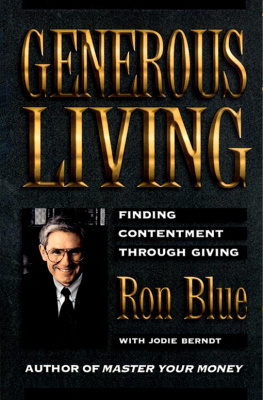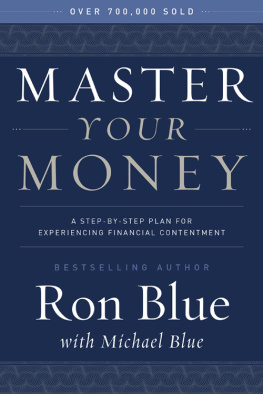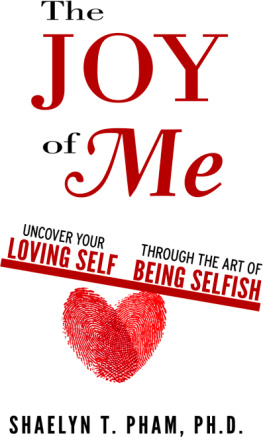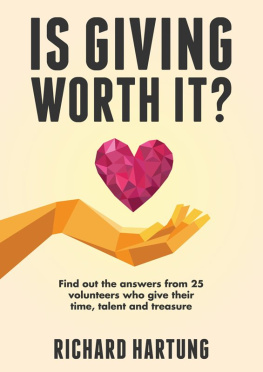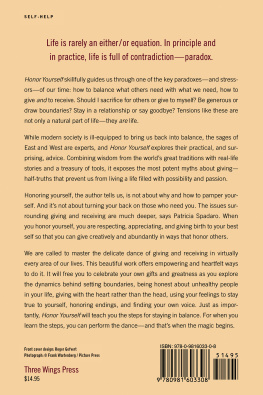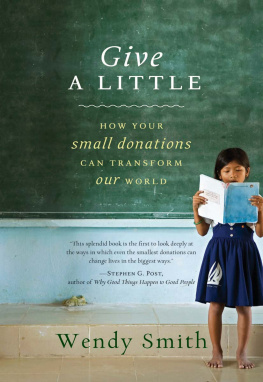one
Generosity
The Secret to True Contentment
The amount of money you have has nothing to do with financial security or contentment. Neither can satisfaction be found in wise investments, careful budgets, or debt-free living. Instead, the secret to financial freedom and joy is directly linked to one thing: the willingness to be generous with what you have.
W HEN THIS BOOK WAS STILL IN ITS INFANCY, I flew to Grand Rapids, Michigan, for a meeting with my editor at Zondervan. As I settled into my seat on the airplane, I couldnt help but notice the young woman next to me. She was attractive, well dressed, and looked about twenty years old. But what struck me more than anything was the discontented, almost angry look she wore. Rarely had I seen a stranger look so unhappy.
Where are you going? I asked, trying to start a conversation.
Grand Rapids, she replied, before focusing her gaze on the magazine she carried. Clearly, she did not want to talk.
I glanced at the magazine. It was one of those in-flight travelers catalogues, offering everything from designer luggage to fancy electronics. As I turned my attention to some paperwork, the young woman continued to scrutinize the catalogue. Finally, after about thirty minutes, she reached for the cellular telephone in the seat in front of us. She ran a credit card through the phone and began punching numbers.
My curiosity aroused, I looked to see what she was up to. Credit card in hand, my young seatmate was systematically working her way through the catalogue, ordering something, it seemed, from almost every page. Never had I witnessed such a thorough (and expensive) shopping spreeto say nothing of the cellular phone bill!
Thirty minutes later she replaced the telephone. I realized this young woman obviously had money to burn. I stole another glance at her face.
She looked just as unhappy as ever.
The picture of that young lady stands in sharp contrast to the images I have in my mind from another trip. Just before I began working on this book, my wife Judy and I flew to Japan, where we visited our daughter, Karen, and her husband, Mark. We traveled through various parts of Asia, touring through Hong Kong with some missionary friends. We happened upon Hong Kong as the city was gearing up for the Chinese New Year festivities. The celebration, we were told, was like an American Thanksgiving, Christmas, New Years, and Fourth of July all rolled into one. Business came to a halt as hundreds of millions of revelers traveled throughout China and Taiwan to join their families and friends.
In Hong Kong itself, the streets were mobbed. We found ourselves swept along with the crowd, weaving our way through thousands of vendors hawking everything from chickens (both live and dead) to finely tailored suits and all manner of electronics. Everywhere we went we were surrounded by high-rise apartments. Stretching skyward from the crush of humanity and dinginess below, the buildings heightened my sense of claustrophobia. As I looked up at the endless lines of laundry flapping from balconies and strung between buildings, I wondered how many people made their home in each one of the apartments towering above us?
I thought about Karen and Marks apartment in Japan, which was smallabout five hundred square feet. The shower stall was in the kitchenbut, as Karen laughingly pointed out, that didnt matter much since the bedroom was only another half step away. The only real discomfort was the cold. Without a central heating system, it might be as cold as twenty degrees Fahrenheit indoors in the morning, before the space heaters were turned on.
A friend had arranged for the four of usKaren, Mark, Judy, and meto stay at the Ritz Carlton in Hong Kong. It was a real treat. In Karens eyes, though, the hotel stay seemed less than remarkable. Like each of my children (and most of their generation), Karen tends to see folks my age as much better off, financially, than she and her peers will ever be. To Karen, it made perfect sense that Judy and I would find ourselves camped in a fancy hotel.
Sometimes I wish I could take my kids back in time, so they could see where weve been. The father they see now is the man who has spent the last seventeen years building a large financial and investment counseling firm. They see the author, the radio commentator, and the public speaker who gets dubbed a financial guru. When I speak, they hear me get introduced sometimes as the guy who is going to give us all the answers.
But thats only part of the picture. What my kids cannot see is the reality of my own childhood, my growing up in post-Depression Indiana. Neither of my parents went to college; my mother only finished the eighth grade. Dad worked in a factory to provide for our family. Instead of renting a beach house or a mountain cabin, we took vacations in relatives homes. Instead of going to theme parks or ball games, we packed picnics for weekend entertainment. And instead of buying new clothes or toys, my brother and I made do with hand-me-downs. Ill never forget the broken baseball bats we taped and tacked back together!
I attended a public high school and then worked my way through Indiana University, waiting tables in my fraternity and borrowing money to pay for my room and board. By the time I finished graduate school in 1967, I had a wife, one child, several thousand dollars worth of school debt, and an ancient turquoise Chevrolet.
I landed a job with a national CPA firm, and Judy and I moved east to New York City. With almost no furniture and even less cash, we used credit to purchase a hide-a-bed and a chair for our modest apartment. Two years later I got transferred, and we loaded up the bed and the chair, along with all of our meager possessions, and moved to Dallas. We found a home we wanted to buy. The only problem was that we had no moneynot even for the down payment. We got a loan for ninety percent of the homes price and asked my father to borrow the other ten percent for us.
Three years and as many moves later, I left the national firm and started my own CPA practice in Indianapolis. I was twenty-eight years old. Thanks to the booming real estate market, Judy and I had made money on each of our houses, but it was not enough to launch a business. To get the company started, I had to go into debt.
Soon, though, the business began to growand with it, our income. I was thirty, Judy was twenty-eight, and we had two young children. We moved to a larger home and joined a country club. To all appearances, we looked like a successful young familyyet I was far from being financially free. Most of the money I made was funneled right back into the business. Then, too, we felt the pressure of all the debt we still carried from our furniture, our home, the business, and the two car payments we made each month.
We joined a socially acceptable church, which we attended more often in the winter than during the summer months, when I preferred to spend Sundays on the golf course. For me, church was primarily a place where I could network and develop business contacts. Judy and I also regarded our church affiliation as being good for the kids.
But things began to change later that year. Judy developed some medical problems that, the doctors told us, brought her within hours of dying. Understandably shaken by the experience, she began to wonder what would have happened had she died. She decided to ask our ministerwho, she soon realized, had no idea how to answer her questions.

